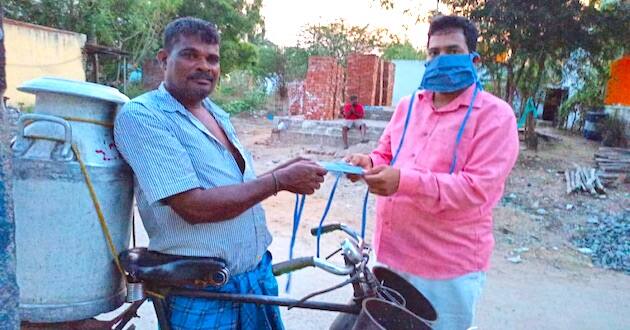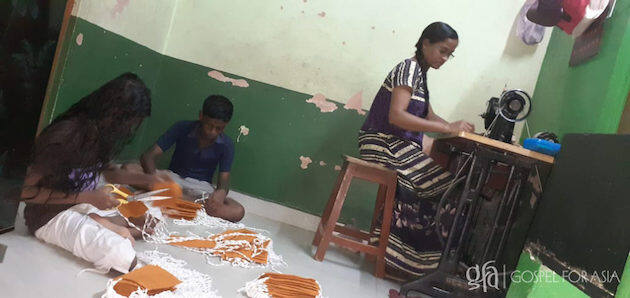Lockdowns and mask laws hit world’s poor the hardest

Around the world, government lockdowns have disproportionately affected the poor. One inequity that has been exposed is unequal access to a mask which, in many cases, are required with the risk of arrest for non-compliance.
Some governments were quick to adopted mandatory mask-wearing in public places in response to official health recommendations from organizations such as the World Health Organization (WHO) and Centers for Disease Control (CDC) even while the CDC released contradictory guidance on masks. As a result, masks have become ubiquitous as people shop, travel and work in congested indoor spaces.
For those who can afford it, adopting masks as part of their daily garb has not been a problem. Many clothing companies now offer masks in cute prints that are readily available. There’s even an Asian fashion designer, QUOD, selling a face mask for almost $100. This highlights the problem: for the resourced, masks are fashion accessories; for the poor, masks are unattainable necessities.
The Rising Costs of Basic Masks
“Wearing a mask in public is now compulsory in most places in India, Pakistan and Sri Lanka and advised by Afghanistan and Bangladesh,” an Asian news outlet reported, “resulting in soaring demand and prices.”
READ: How one ministry is fighting mosquito deaths
Basic masks that in March cost 8 cents now go for $7. Even when governments cap mask prices, local businesses mark them up and out of reach for poor communities.

“I have earned less than 100 afghani ($1.32) today. What am I going to do?” Khan told the Reuters news agency in the Afghan capital Kabul. “Should I buy a mask or food for my family?”
Then there’s Milan, a milkman in India, who goes door-to-door every day, unmasked. Milan knows he should wear a mask, but he is not able to buy one.
Arrests, Fines Stalk Daily Wage Laborers
India, which is producing surgical masks beyond the national demand, has begun exporting surplus masks to satisfy global demand. Despite manufacturing enough masks nationwide, not all communities have equal access to the mandatory device.
With a spike in new cases, many Asian countries and states have cracked down on people not wearing masks in public. It is not stigma that prevents people from wearing masks; they have been common in Asia to prevent the spread of pedestrian illnesses such as the cold or flu for a long time. Lack of access is the problem. Local medical stores that normally stock such an ubiquitous item are now out of stock in poorer communities. This creates a difficult situation for those who cannot get masks but need to work and those who are tasked with enforcing the laws.
In one Asian city, 12,000 people were arrested for violating the mandatory mask statute in the span of four weeks.
In one Asian city, 12,000 people were arrested for violating the mandatory mask statute in the span of four weeks.
Other places have instituted large fines for anyone not wearing a mask in public. Since many of these people can’t afford a mask, they are unlikely to be able to pay fines either, creating an even more unbearable financial burden on the poor.
Fines for not wearing a mask in public are popping up in countries all over the world, not just in Asia. In Italy, the fine is 1,000 euros ($1,183 USD). In Miami, Florida, it’s $100. In Gujurat, India, it’s 1,000 rupees ($13 USD). Thirteen dollars may not sound like much compared to $1,000, but hundreds of millions of people living in extreme poverty, on less than $1.90 a day, live in South Asia. This income barely stretches to housing and food.
Many of the people arrested for violating the mask requirements were daily wage laborers who faced staying home and starving or working and gambling arrests and fines.
Grassroot Solutions by NGOs and Ministries
Many NGO and charity organizations, such as Gospel for Asia (GFA), have sought to fill in the gap between resources and the needy communities that don’t have access to them. GFA World supports national workers to bring God’s provision and love to destitute peoples all over Asia. It is these men and women, serving God in their own communities, who are bringing relief at the ground level.

GFA pastor Pravin saw the difficulties the poor in his community were facing. He wanted to ease the burden, so he coordinated with staff of Bridge of Hope, a GFA World program that provides tutoring, school supplies and a nutritious meal to underprivileged children, to sew and distribute 30 masks to people in need.
Another GFA worker who leads a Women’s Fellowship, a group committed to the discipling and equipping of women in the local church, united the ladies to sew 150 reusable masks in one day to distribute to the most vulnerable in their community: the elderly and children.
GFA workers serve tirelessly to alleviate suffering caused by COVID-19, from feeding migrant workers on their mass exodus from congested cities to providing groceries for widows and leprosy patients who struggle to get food. Many are also organizing Bridge of Hope staff, Women’s Fellowship groups and local believers to sew reusable masks for those who can’t get one.
Even conscientious businesses acknowledge the inequalities between the rich and the poor and are taking action. Poochki, an Indian clothing retailer, will donate a mask to someone in need for every $2 mask purchased.
In the village where Milan the milkman lives, GFA pastor Abeer and his church members distributed 350 reusable face masks, stitched by the Women’s Fellowship, to daily wage laborers, including Milan.
“I am grateful to the church leaders for helping me to get a reusable and hand-stitched face mask,” Milan said. “I need a face mask as I go out for giving milk from door-to-door.”
These efforts to help each other is more important now than ever. In a time everyone in the world is facing a pandemic together, it has become clear that the burden is greater for some than others. In providing masks for the poor, we carry one another’s burdens and restrict the spread of COVID-19.
–Assist News Service






